Analyzing the UK Legal System: Business Law, Case & Legislation
VerifiedAdded on 2023/06/13
|10
|2967
|329
Report
AI Summary
This report provides a comprehensive analysis of the UK legal system within the context of business law. It begins by defining laws and identifying the legal systems in the UK, differentiating between civil and criminal law with examples, and explaining the roles of the High Court and Supreme Court. The report then explores case law and legislation as sources of law, detailing the legislative process and delegated legislation. Finally, it examines the UK law-making process, focusing on statutory duties of employers to their employees, as well as wrongful and unfair dismissal actions. This document provides a valuable overview for understanding the legal landscape affecting businesses in the United Kingdom. Desklib offers similar solved assignments and past papers for students.
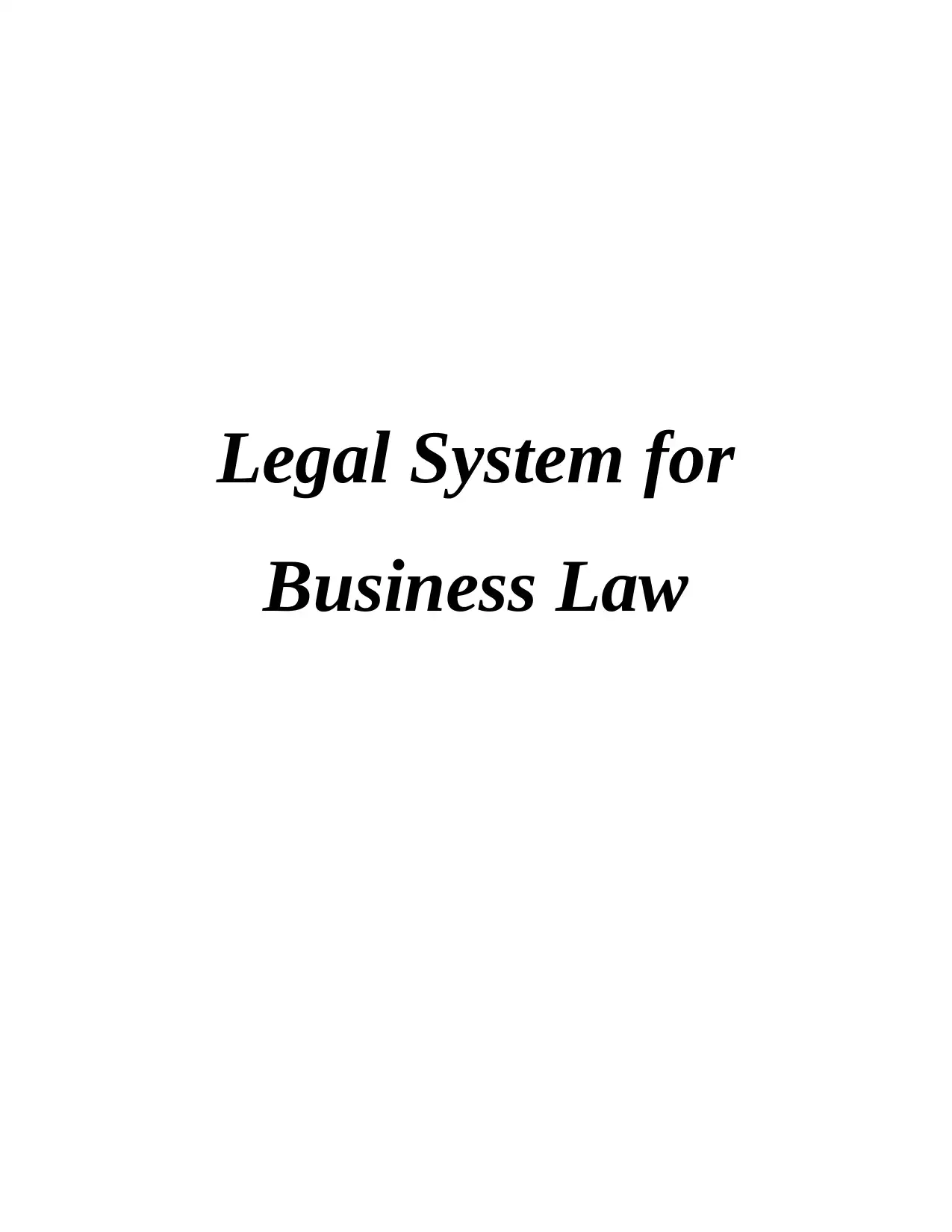
Legal System for
Business Law
Business Law
Paraphrase This Document
Need a fresh take? Get an instant paraphrase of this document with our AI Paraphraser
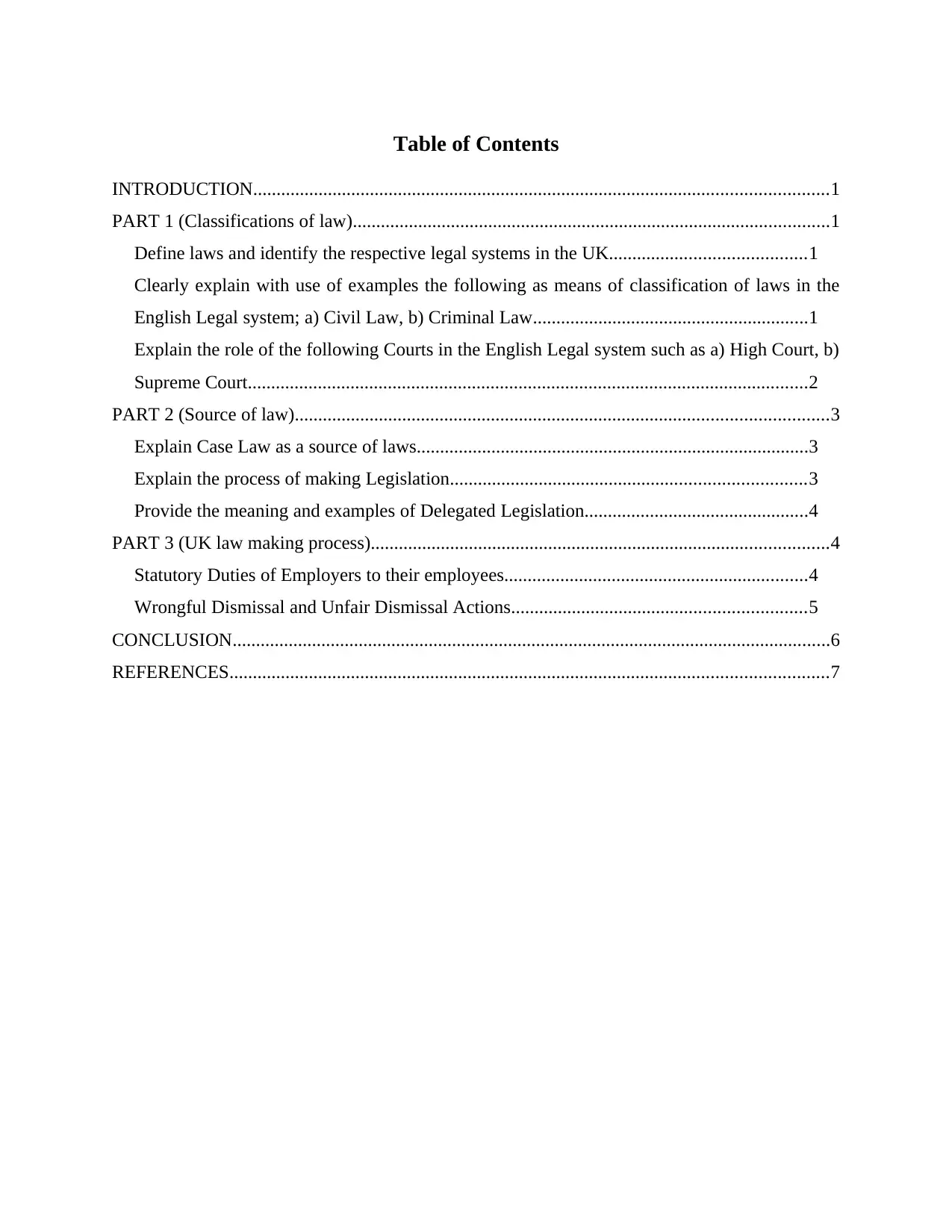
Table of Contents
INTRODUCTION...........................................................................................................................1
PART 1 (Classifications of law)......................................................................................................1
Define laws and identify the respective legal systems in the UK..........................................1
Clearly explain with use of examples the following as means of classification of laws in the
English Legal system; a) Civil Law, b) Criminal Law...........................................................1
Explain the role of the following Courts in the English Legal system such as a) High Court, b)
Supreme Court........................................................................................................................2
PART 2 (Source of law)..................................................................................................................3
Explain Case Law as a source of laws....................................................................................3
Explain the process of making Legislation............................................................................3
Provide the meaning and examples of Delegated Legislation................................................4
PART 3 (UK law making process)..................................................................................................4
Statutory Duties of Employers to their employees.................................................................4
Wrongful Dismissal and Unfair Dismissal Actions...............................................................5
CONCLUSION................................................................................................................................6
REFERENCES................................................................................................................................7
INTRODUCTION...........................................................................................................................1
PART 1 (Classifications of law)......................................................................................................1
Define laws and identify the respective legal systems in the UK..........................................1
Clearly explain with use of examples the following as means of classification of laws in the
English Legal system; a) Civil Law, b) Criminal Law...........................................................1
Explain the role of the following Courts in the English Legal system such as a) High Court, b)
Supreme Court........................................................................................................................2
PART 2 (Source of law)..................................................................................................................3
Explain Case Law as a source of laws....................................................................................3
Explain the process of making Legislation............................................................................3
Provide the meaning and examples of Delegated Legislation................................................4
PART 3 (UK law making process)..................................................................................................4
Statutory Duties of Employers to their employees.................................................................4
Wrongful Dismissal and Unfair Dismissal Actions...............................................................5
CONCLUSION................................................................................................................................6
REFERENCES................................................................................................................................7
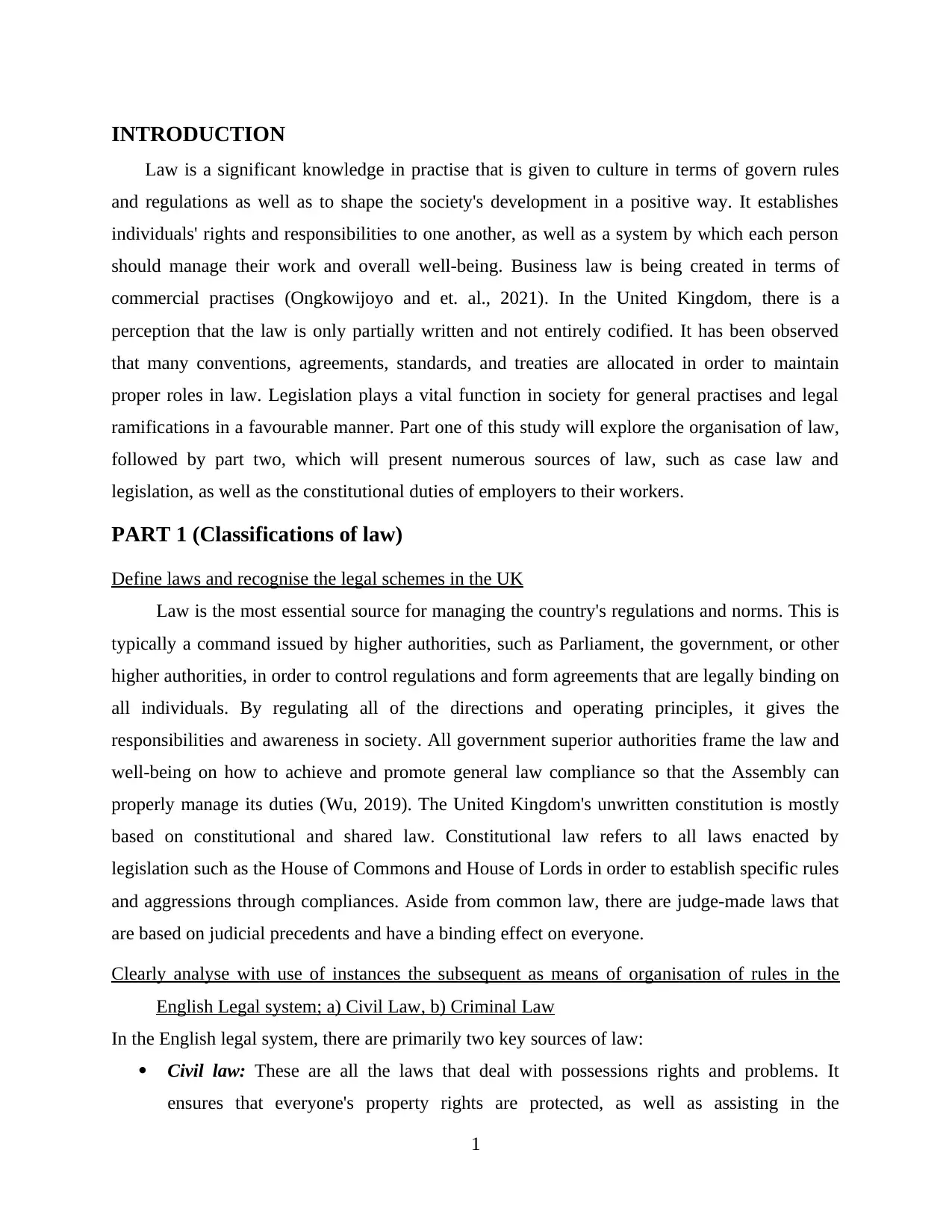
INTRODUCTION
Law is a significant knowledge in practise that is given to culture in terms of govern rules
and regulations as well as to shape the society's development in a positive way. It establishes
individuals' rights and responsibilities to one another, as well as a system by which each person
should manage their work and overall well-being. Business law is being created in terms of
commercial practises (Ongkowijoyo and et. al., 2021). In the United Kingdom, there is a
perception that the law is only partially written and not entirely codified. It has been observed
that many conventions, agreements, standards, and treaties are allocated in order to maintain
proper roles in law. Legislation plays a vital function in society for general practises and legal
ramifications in a favourable manner. Part one of this study will explore the organisation of law,
followed by part two, which will present numerous sources of law, such as case law and
legislation, as well as the constitutional duties of employers to their workers.
PART 1 (Classifications of law)
Define laws and recognise the legal schemes in the UK
Law is the most essential source for managing the country's regulations and norms. This is
typically a command issued by higher authorities, such as Parliament, the government, or other
higher authorities, in order to control regulations and form agreements that are legally binding on
all individuals. By regulating all of the directions and operating principles, it gives the
responsibilities and awareness in society. All government superior authorities frame the law and
well-being on how to achieve and promote general law compliance so that the Assembly can
properly manage its duties (Wu, 2019). The United Kingdom's unwritten constitution is mostly
based on constitutional and shared law. Constitutional law refers to all laws enacted by
legislation such as the House of Commons and House of Lords in order to establish specific rules
and aggressions through compliances. Aside from common law, there are judge-made laws that
are based on judicial precedents and have a binding effect on everyone.
Clearly analyse with use of instances the subsequent as means of organisation of rules in the
English Legal system; a) Civil Law, b) Criminal Law
In the English legal system, there are primarily two key sources of law:
Civil law: These are all the laws that deal with possessions rights and problems. It
ensures that everyone's property rights are protected, as well as assisting in the
1
Law is a significant knowledge in practise that is given to culture in terms of govern rules
and regulations as well as to shape the society's development in a positive way. It establishes
individuals' rights and responsibilities to one another, as well as a system by which each person
should manage their work and overall well-being. Business law is being created in terms of
commercial practises (Ongkowijoyo and et. al., 2021). In the United Kingdom, there is a
perception that the law is only partially written and not entirely codified. It has been observed
that many conventions, agreements, standards, and treaties are allocated in order to maintain
proper roles in law. Legislation plays a vital function in society for general practises and legal
ramifications in a favourable manner. Part one of this study will explore the organisation of law,
followed by part two, which will present numerous sources of law, such as case law and
legislation, as well as the constitutional duties of employers to their workers.
PART 1 (Classifications of law)
Define laws and recognise the legal schemes in the UK
Law is the most essential source for managing the country's regulations and norms. This is
typically a command issued by higher authorities, such as Parliament, the government, or other
higher authorities, in order to control regulations and form agreements that are legally binding on
all individuals. By regulating all of the directions and operating principles, it gives the
responsibilities and awareness in society. All government superior authorities frame the law and
well-being on how to achieve and promote general law compliance so that the Assembly can
properly manage its duties (Wu, 2019). The United Kingdom's unwritten constitution is mostly
based on constitutional and shared law. Constitutional law refers to all laws enacted by
legislation such as the House of Commons and House of Lords in order to establish specific rules
and aggressions through compliances. Aside from common law, there are judge-made laws that
are based on judicial precedents and have a binding effect on everyone.
Clearly analyse with use of instances the subsequent as means of organisation of rules in the
English Legal system; a) Civil Law, b) Criminal Law
In the English legal system, there are primarily two key sources of law:
Civil law: These are all the laws that deal with possessions rights and problems. It
ensures that everyone's property rights are protected, as well as assisting in the
1
⊘ This is a preview!⊘
Do you want full access?
Subscribe today to unlock all pages.

Trusted by 1+ million students worldwide
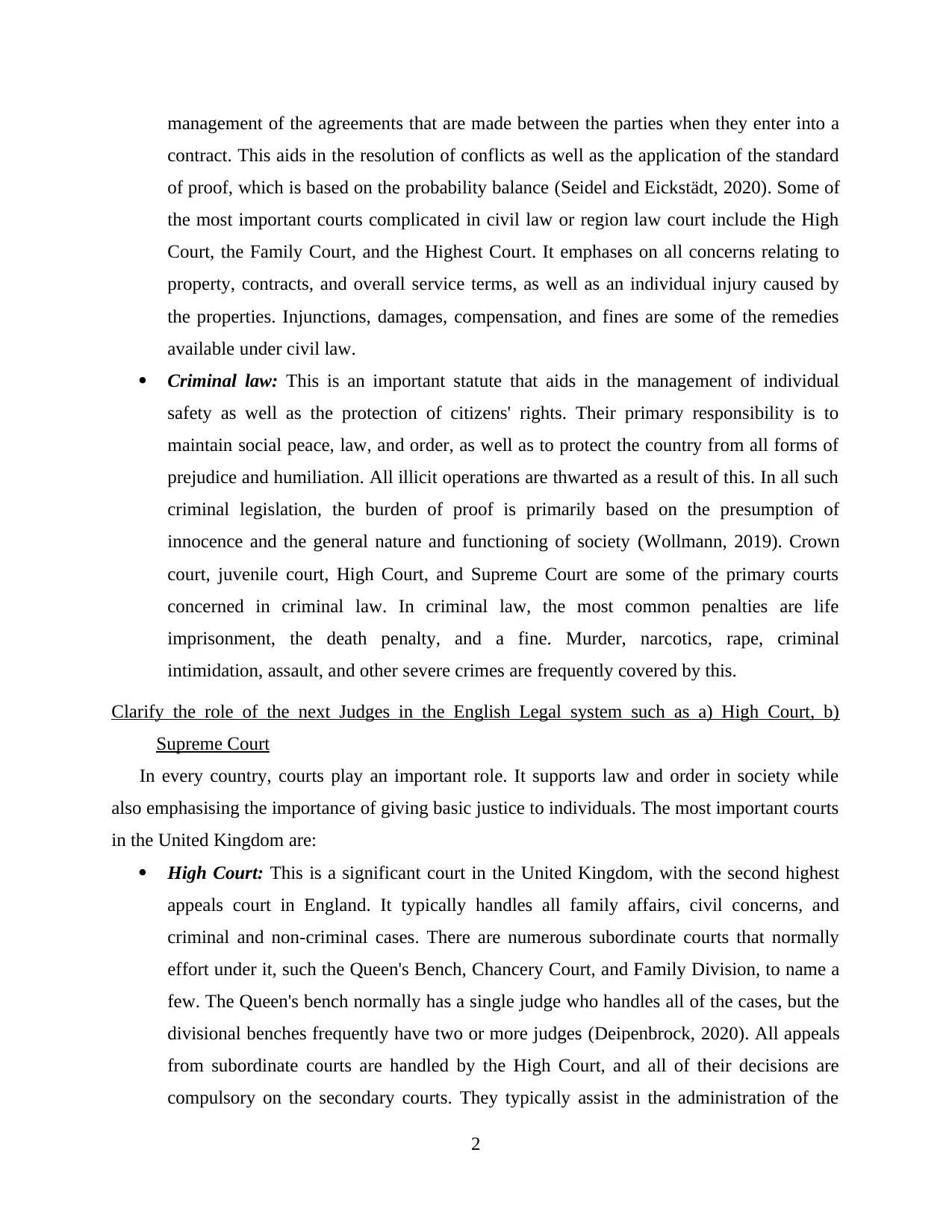
management of the agreements that are made between the parties when they enter into a
contract. This aids in the resolution of conflicts as well as the application of the standard
of proof, which is based on the probability balance (Seidel and Eickstädt, 2020). Some of
the most important courts complicated in civil law or region law court include the High
Court, the Family Court, and the Highest Court. It emphases on all concerns relating to
property, contracts, and overall service terms, as well as an individual injury caused by
the properties. Injunctions, damages, compensation, and fines are some of the remedies
available under civil law.
Criminal law: This is an important statute that aids in the management of individual
safety as well as the protection of citizens' rights. Their primary responsibility is to
maintain social peace, law, and order, as well as to protect the country from all forms of
prejudice and humiliation. All illicit operations are thwarted as a result of this. In all such
criminal legislation, the burden of proof is primarily based on the presumption of
innocence and the general nature and functioning of society (Wollmann, 2019). Crown
court, juvenile court, High Court, and Supreme Court are some of the primary courts
concerned in criminal law. In criminal law, the most common penalties are life
imprisonment, the death penalty, and a fine. Murder, narcotics, rape, criminal
intimidation, assault, and other severe crimes are frequently covered by this.
Clarify the role of the next Judges in the English Legal system such as a) High Court, b)
Supreme Court
In every country, courts play an important role. It supports law and order in society while
also emphasising the importance of giving basic justice to individuals. The most important courts
in the United Kingdom are:
High Court: This is a significant court in the United Kingdom, with the second highest
appeals court in England. It typically handles all family affairs, civil concerns, and
criminal and non-criminal cases. There are numerous subordinate courts that normally
effort under it, such the Queen's Bench, Chancery Court, and Family Division, to name a
few. The Queen's bench normally has a single judge who handles all of the cases, but the
divisional benches frequently have two or more judges (Deipenbrock, 2020). All appeals
from subordinate courts are handled by the High Court, and all of their decisions are
compulsory on the secondary courts. They typically assist in the administration of the
2
contract. This aids in the resolution of conflicts as well as the application of the standard
of proof, which is based on the probability balance (Seidel and Eickstädt, 2020). Some of
the most important courts complicated in civil law or region law court include the High
Court, the Family Court, and the Highest Court. It emphases on all concerns relating to
property, contracts, and overall service terms, as well as an individual injury caused by
the properties. Injunctions, damages, compensation, and fines are some of the remedies
available under civil law.
Criminal law: This is an important statute that aids in the management of individual
safety as well as the protection of citizens' rights. Their primary responsibility is to
maintain social peace, law, and order, as well as to protect the country from all forms of
prejudice and humiliation. All illicit operations are thwarted as a result of this. In all such
criminal legislation, the burden of proof is primarily based on the presumption of
innocence and the general nature and functioning of society (Wollmann, 2019). Crown
court, juvenile court, High Court, and Supreme Court are some of the primary courts
concerned in criminal law. In criminal law, the most common penalties are life
imprisonment, the death penalty, and a fine. Murder, narcotics, rape, criminal
intimidation, assault, and other severe crimes are frequently covered by this.
Clarify the role of the next Judges in the English Legal system such as a) High Court, b)
Supreme Court
In every country, courts play an important role. It supports law and order in society while
also emphasising the importance of giving basic justice to individuals. The most important courts
in the United Kingdom are:
High Court: This is a significant court in the United Kingdom, with the second highest
appeals court in England. It typically handles all family affairs, civil concerns, and
criminal and non-criminal cases. There are numerous subordinate courts that normally
effort under it, such the Queen's Bench, Chancery Court, and Family Division, to name a
few. The Queen's bench normally has a single judge who handles all of the cases, but the
divisional benches frequently have two or more judges (Deipenbrock, 2020). All appeals
from subordinate courts are handled by the High Court, and all of their decisions are
compulsory on the secondary courts. They typically assist in the administration of the
2
Paraphrase This Document
Need a fresh take? Get an instant paraphrase of this document with our AI Paraphraser
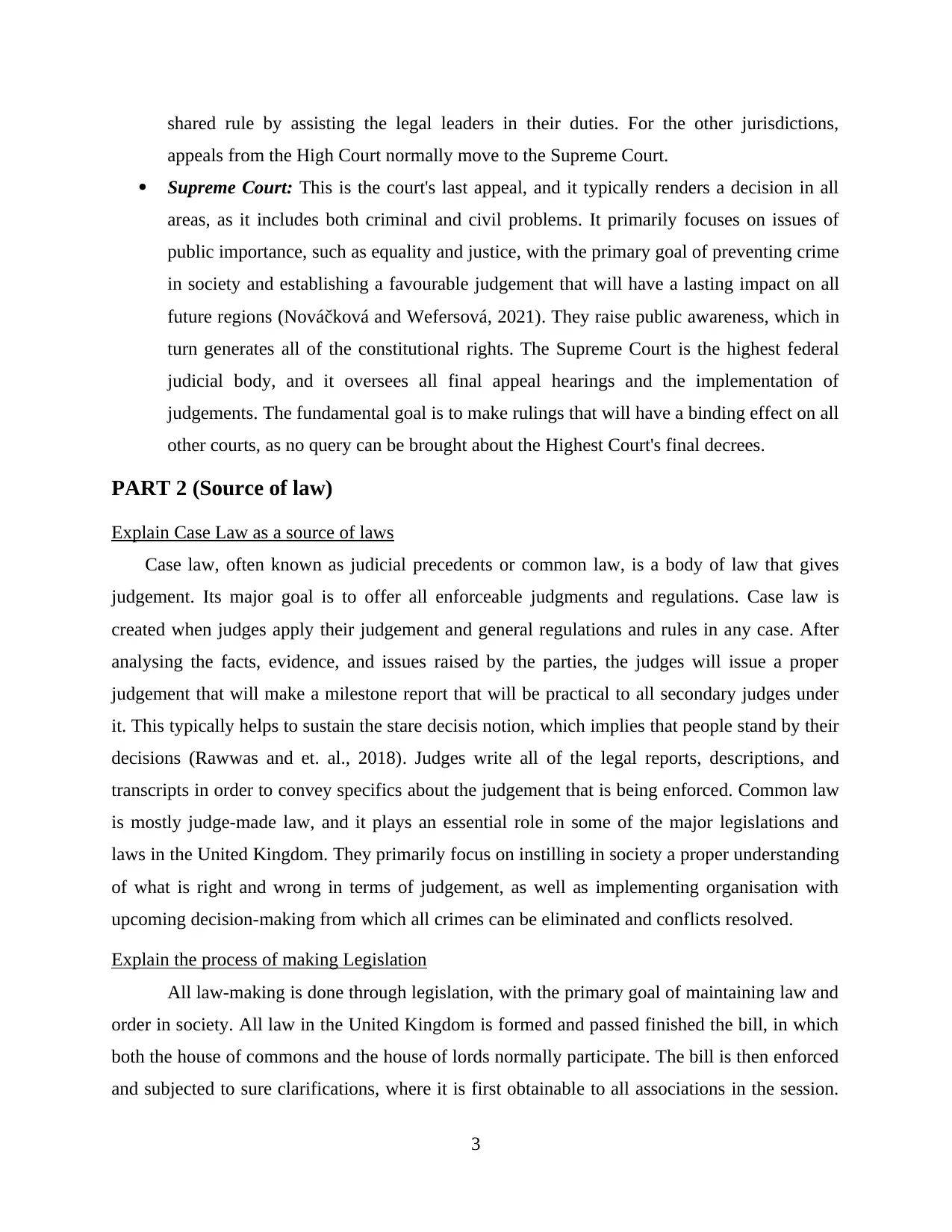
shared rule by assisting the legal leaders in their duties. For the other jurisdictions,
appeals from the High Court normally move to the Supreme Court.
Supreme Court: This is the court's last appeal, and it typically renders a decision in all
areas, as it includes both criminal and civil problems. It primarily focuses on issues of
public importance, such as equality and justice, with the primary goal of preventing crime
in society and establishing a favourable judgement that will have a lasting impact on all
future regions (Nováčková and Wefersová, 2021). They raise public awareness, which in
turn generates all of the constitutional rights. The Supreme Court is the highest federal
judicial body, and it oversees all final appeal hearings and the implementation of
judgements. The fundamental goal is to make rulings that will have a binding effect on all
other courts, as no query can be brought about the Highest Court's final decrees.
PART 2 (Source of law)
Explain Case Law as a source of laws
Case law, often known as judicial precedents or common law, is a body of law that gives
judgement. Its major goal is to offer all enforceable judgments and regulations. Case law is
created when judges apply their judgement and general regulations and rules in any case. After
analysing the facts, evidence, and issues raised by the parties, the judges will issue a proper
judgement that will make a milestone report that will be practical to all secondary judges under
it. This typically helps to sustain the stare decisis notion, which implies that people stand by their
decisions (Rawwas and et. al., 2018). Judges write all of the legal reports, descriptions, and
transcripts in order to convey specifics about the judgement that is being enforced. Common law
is mostly judge-made law, and it plays an essential role in some of the major legislations and
laws in the United Kingdom. They primarily focus on instilling in society a proper understanding
of what is right and wrong in terms of judgement, as well as implementing organisation with
upcoming decision-making from which all crimes can be eliminated and conflicts resolved.
Explain the process of making Legislation
All law-making is done through legislation, with the primary goal of maintaining law and
order in society. All law in the United Kingdom is formed and passed finished the bill, in which
both the house of commons and the house of lords normally participate. The bill is then enforced
and subjected to sure clarifications, where it is first obtainable to all associations in the session.
3
appeals from the High Court normally move to the Supreme Court.
Supreme Court: This is the court's last appeal, and it typically renders a decision in all
areas, as it includes both criminal and civil problems. It primarily focuses on issues of
public importance, such as equality and justice, with the primary goal of preventing crime
in society and establishing a favourable judgement that will have a lasting impact on all
future regions (Nováčková and Wefersová, 2021). They raise public awareness, which in
turn generates all of the constitutional rights. The Supreme Court is the highest federal
judicial body, and it oversees all final appeal hearings and the implementation of
judgements. The fundamental goal is to make rulings that will have a binding effect on all
other courts, as no query can be brought about the Highest Court's final decrees.
PART 2 (Source of law)
Explain Case Law as a source of laws
Case law, often known as judicial precedents or common law, is a body of law that gives
judgement. Its major goal is to offer all enforceable judgments and regulations. Case law is
created when judges apply their judgement and general regulations and rules in any case. After
analysing the facts, evidence, and issues raised by the parties, the judges will issue a proper
judgement that will make a milestone report that will be practical to all secondary judges under
it. This typically helps to sustain the stare decisis notion, which implies that people stand by their
decisions (Rawwas and et. al., 2018). Judges write all of the legal reports, descriptions, and
transcripts in order to convey specifics about the judgement that is being enforced. Common law
is mostly judge-made law, and it plays an essential role in some of the major legislations and
laws in the United Kingdom. They primarily focus on instilling in society a proper understanding
of what is right and wrong in terms of judgement, as well as implementing organisation with
upcoming decision-making from which all crimes can be eliminated and conflicts resolved.
Explain the process of making Legislation
All law-making is done through legislation, with the primary goal of maintaining law and
order in society. All law in the United Kingdom is formed and passed finished the bill, in which
both the house of commons and the house of lords normally participate. The bill is then enforced
and subjected to sure clarifications, where it is first obtainable to all associations in the session.
3
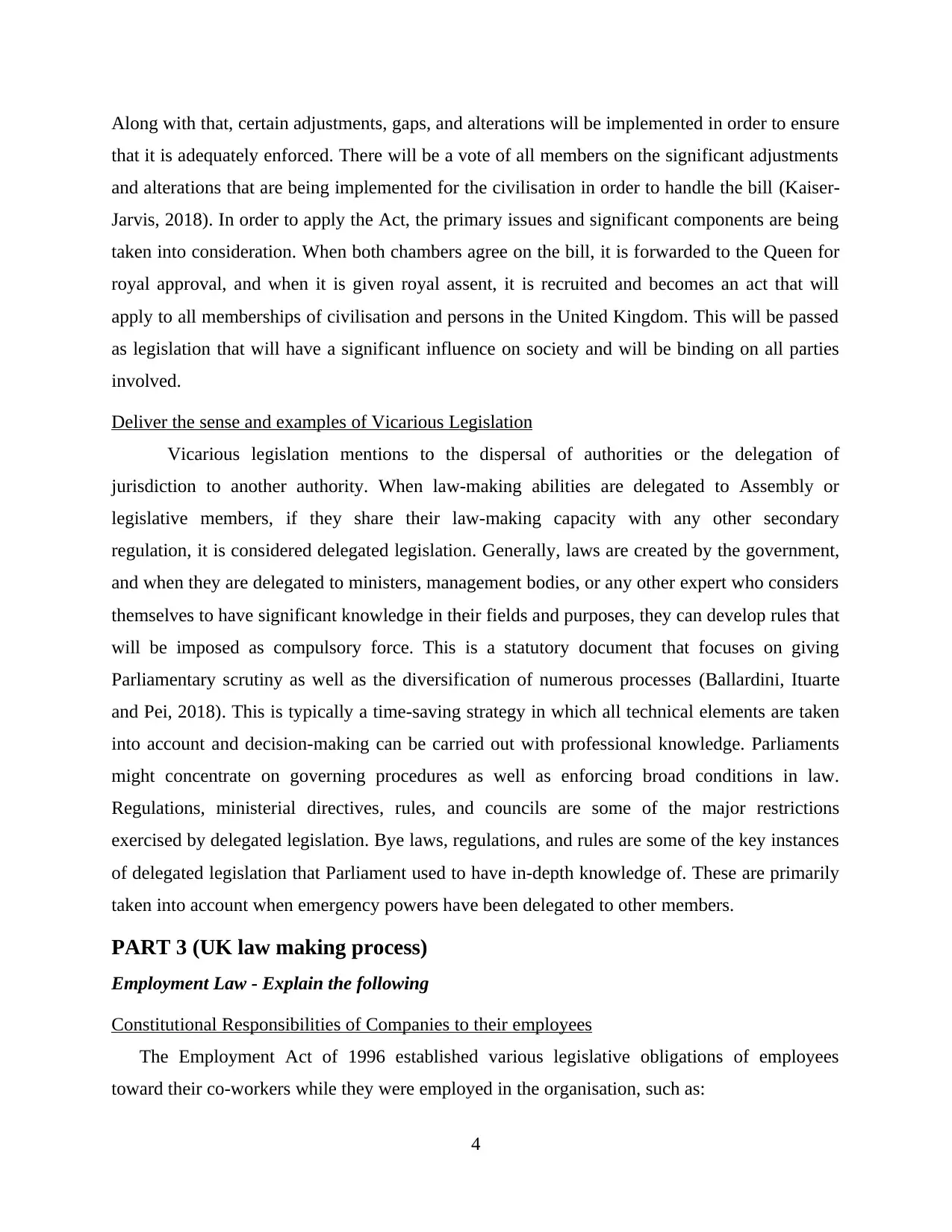
Along with that, certain adjustments, gaps, and alterations will be implemented in order to ensure
that it is adequately enforced. There will be a vote of all members on the significant adjustments
and alterations that are being implemented for the civilisation in order to handle the bill (Kaiser-
Jarvis, 2018). In order to apply the Act, the primary issues and significant components are being
taken into consideration. When both chambers agree on the bill, it is forwarded to the Queen for
royal approval, and when it is given royal assent, it is recruited and becomes an act that will
apply to all memberships of civilisation and persons in the United Kingdom. This will be passed
as legislation that will have a significant influence on society and will be binding on all parties
involved.
Deliver the sense and examples of Vicarious Legislation
Vicarious legislation mentions to the dispersal of authorities or the delegation of
jurisdiction to another authority. When law-making abilities are delegated to Assembly or
legislative members, if they share their law-making capacity with any other secondary
regulation, it is considered delegated legislation. Generally, laws are created by the government,
and when they are delegated to ministers, management bodies, or any other expert who considers
themselves to have significant knowledge in their fields and purposes, they can develop rules that
will be imposed as compulsory force. This is a statutory document that focuses on giving
Parliamentary scrutiny as well as the diversification of numerous processes (Ballardini, Ituarte
and Pei, 2018). This is typically a time-saving strategy in which all technical elements are taken
into account and decision-making can be carried out with professional knowledge. Parliaments
might concentrate on governing procedures as well as enforcing broad conditions in law.
Regulations, ministerial directives, rules, and councils are some of the major restrictions
exercised by delegated legislation. Bye laws, regulations, and rules are some of the key instances
of delegated legislation that Parliament used to have in-depth knowledge of. These are primarily
taken into account when emergency powers have been delegated to other members.
PART 3 (UK law making process)
Employment Law - Explain the following
Constitutional Responsibilities of Companies to their employees
The Employment Act of 1996 established various legislative obligations of employees
toward their co-workers while they were employed in the organisation, such as:
4
that it is adequately enforced. There will be a vote of all members on the significant adjustments
and alterations that are being implemented for the civilisation in order to handle the bill (Kaiser-
Jarvis, 2018). In order to apply the Act, the primary issues and significant components are being
taken into consideration. When both chambers agree on the bill, it is forwarded to the Queen for
royal approval, and when it is given royal assent, it is recruited and becomes an act that will
apply to all memberships of civilisation and persons in the United Kingdom. This will be passed
as legislation that will have a significant influence on society and will be binding on all parties
involved.
Deliver the sense and examples of Vicarious Legislation
Vicarious legislation mentions to the dispersal of authorities or the delegation of
jurisdiction to another authority. When law-making abilities are delegated to Assembly or
legislative members, if they share their law-making capacity with any other secondary
regulation, it is considered delegated legislation. Generally, laws are created by the government,
and when they are delegated to ministers, management bodies, or any other expert who considers
themselves to have significant knowledge in their fields and purposes, they can develop rules that
will be imposed as compulsory force. This is a statutory document that focuses on giving
Parliamentary scrutiny as well as the diversification of numerous processes (Ballardini, Ituarte
and Pei, 2018). This is typically a time-saving strategy in which all technical elements are taken
into account and decision-making can be carried out with professional knowledge. Parliaments
might concentrate on governing procedures as well as enforcing broad conditions in law.
Regulations, ministerial directives, rules, and councils are some of the major restrictions
exercised by delegated legislation. Bye laws, regulations, and rules are some of the key instances
of delegated legislation that Parliament used to have in-depth knowledge of. These are primarily
taken into account when emergency powers have been delegated to other members.
PART 3 (UK law making process)
Employment Law - Explain the following
Constitutional Responsibilities of Companies to their employees
The Employment Act of 1996 established various legislative obligations of employees
toward their co-workers while they were employed in the organisation, such as:
4
⊘ This is a preview!⊘
Do you want full access?
Subscribe today to unlock all pages.

Trusted by 1+ million students worldwide
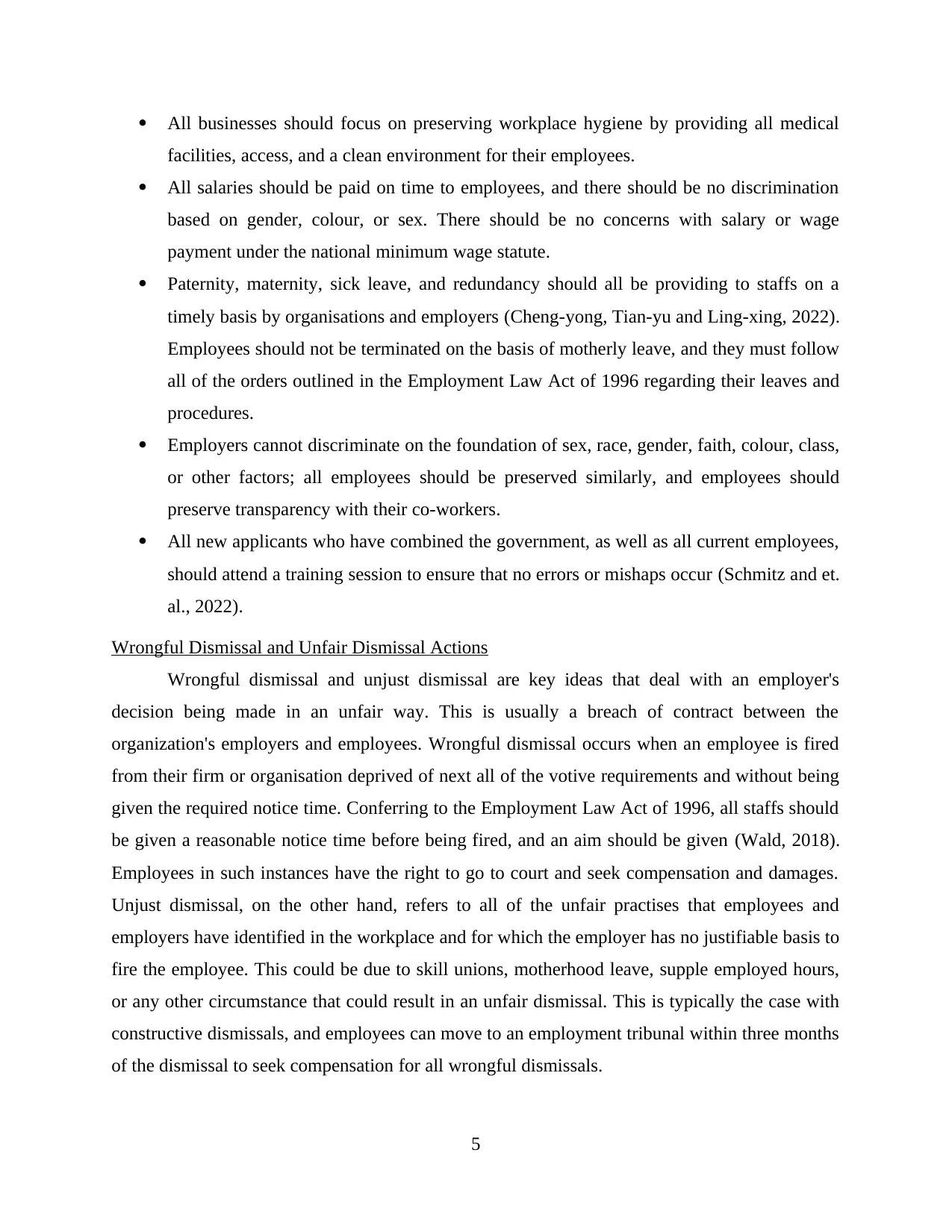
All businesses should focus on preserving workplace hygiene by providing all medical
facilities, access, and a clean environment for their employees.
All salaries should be paid on time to employees, and there should be no discrimination
based on gender, colour, or sex. There should be no concerns with salary or wage
payment under the national minimum wage statute.
Paternity, maternity, sick leave, and redundancy should all be providing to staffs on a
timely basis by organisations and employers (Cheng-yong, Tian-yu and Ling-xing, 2022).
Employees should not be terminated on the basis of motherly leave, and they must follow
all of the orders outlined in the Employment Law Act of 1996 regarding their leaves and
procedures.
Employers cannot discriminate on the foundation of sex, race, gender, faith, colour, class,
or other factors; all employees should be preserved similarly, and employees should
preserve transparency with their co-workers.
All new applicants who have combined the government, as well as all current employees,
should attend a training session to ensure that no errors or mishaps occur (Schmitz and et.
al., 2022).
Wrongful Dismissal and Unfair Dismissal Actions
Wrongful dismissal and unjust dismissal are key ideas that deal with an employer's
decision being made in an unfair way. This is usually a breach of contract between the
organization's employers and employees. Wrongful dismissal occurs when an employee is fired
from their firm or organisation deprived of next all of the votive requirements and without being
given the required notice time. Conferring to the Employment Law Act of 1996, all staffs should
be given a reasonable notice time before being fired, and an aim should be given (Wald, 2018).
Employees in such instances have the right to go to court and seek compensation and damages.
Unjust dismissal, on the other hand, refers to all of the unfair practises that employees and
employers have identified in the workplace and for which the employer has no justifiable basis to
fire the employee. This could be due to skill unions, motherhood leave, supple employed hours,
or any other circumstance that could result in an unfair dismissal. This is typically the case with
constructive dismissals, and employees can move to an employment tribunal within three months
of the dismissal to seek compensation for all wrongful dismissals.
5
facilities, access, and a clean environment for their employees.
All salaries should be paid on time to employees, and there should be no discrimination
based on gender, colour, or sex. There should be no concerns with salary or wage
payment under the national minimum wage statute.
Paternity, maternity, sick leave, and redundancy should all be providing to staffs on a
timely basis by organisations and employers (Cheng-yong, Tian-yu and Ling-xing, 2022).
Employees should not be terminated on the basis of motherly leave, and they must follow
all of the orders outlined in the Employment Law Act of 1996 regarding their leaves and
procedures.
Employers cannot discriminate on the foundation of sex, race, gender, faith, colour, class,
or other factors; all employees should be preserved similarly, and employees should
preserve transparency with their co-workers.
All new applicants who have combined the government, as well as all current employees,
should attend a training session to ensure that no errors or mishaps occur (Schmitz and et.
al., 2022).
Wrongful Dismissal and Unfair Dismissal Actions
Wrongful dismissal and unjust dismissal are key ideas that deal with an employer's
decision being made in an unfair way. This is usually a breach of contract between the
organization's employers and employees. Wrongful dismissal occurs when an employee is fired
from their firm or organisation deprived of next all of the votive requirements and without being
given the required notice time. Conferring to the Employment Law Act of 1996, all staffs should
be given a reasonable notice time before being fired, and an aim should be given (Wald, 2018).
Employees in such instances have the right to go to court and seek compensation and damages.
Unjust dismissal, on the other hand, refers to all of the unfair practises that employees and
employers have identified in the workplace and for which the employer has no justifiable basis to
fire the employee. This could be due to skill unions, motherhood leave, supple employed hours,
or any other circumstance that could result in an unfair dismissal. This is typically the case with
constructive dismissals, and employees can move to an employment tribunal within three months
of the dismissal to seek compensation for all wrongful dismissals.
5
Paraphrase This Document
Need a fresh take? Get an instant paraphrase of this document with our AI Paraphraser
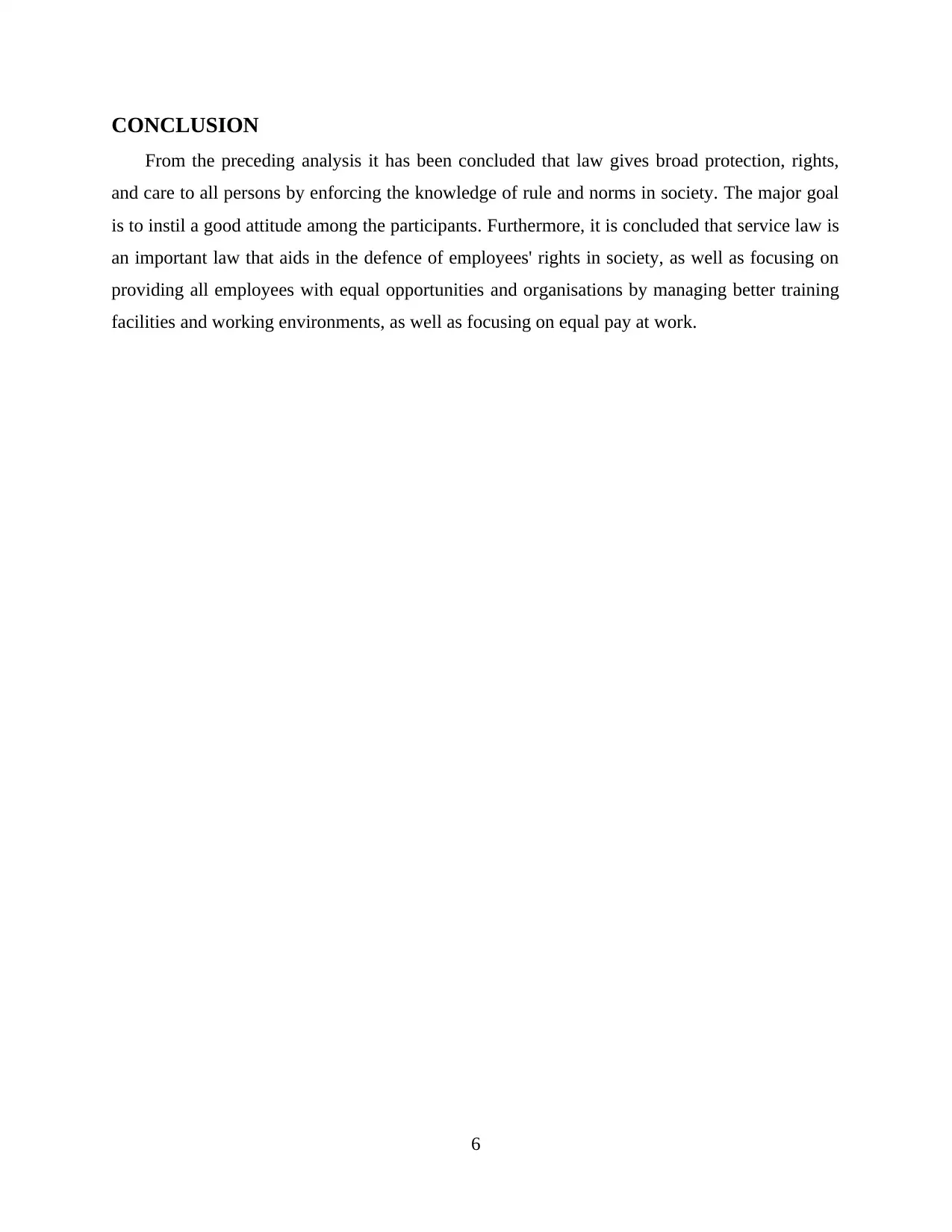
CONCLUSION
From the preceding analysis it has been concluded that law gives broad protection, rights,
and care to all persons by enforcing the knowledge of rule and norms in society. The major goal
is to instil a good attitude among the participants. Furthermore, it is concluded that service law is
an important law that aids in the defence of employees' rights in society, as well as focusing on
providing all employees with equal opportunities and organisations by managing better training
facilities and working environments, as well as focusing on equal pay at work.
6
From the preceding analysis it has been concluded that law gives broad protection, rights,
and care to all persons by enforcing the knowledge of rule and norms in society. The major goal
is to instil a good attitude among the participants. Furthermore, it is concluded that service law is
an important law that aids in the defence of employees' rights in society, as well as focusing on
providing all employees with equal opportunities and organisations by managing better training
facilities and working environments, as well as focusing on equal pay at work.
6
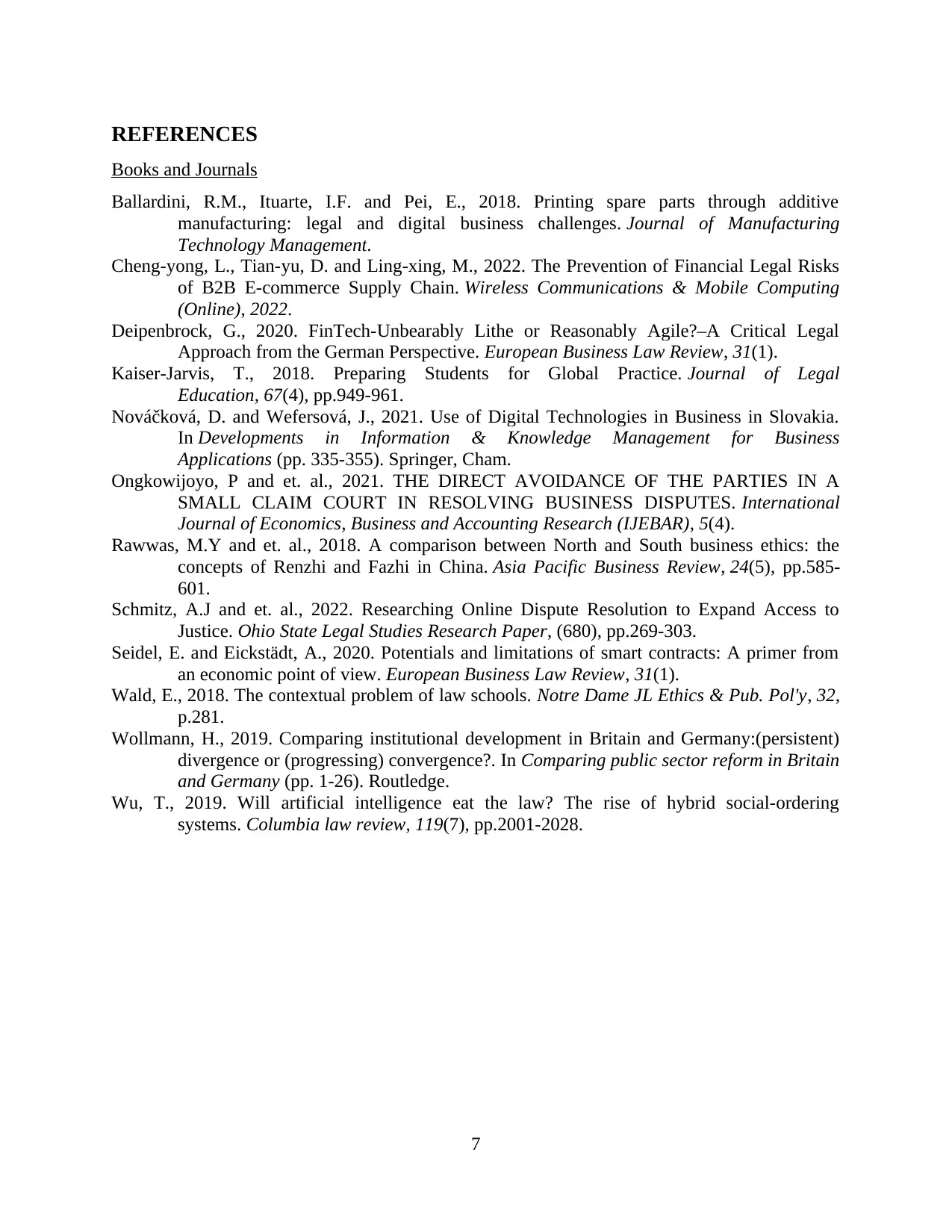
REFERENCES
Books and Journals
Ballardini, R.M., Ituarte, I.F. and Pei, E., 2018. Printing spare parts through additive
manufacturing: legal and digital business challenges. Journal of Manufacturing
Technology Management.
Cheng-yong, L., Tian-yu, D. and Ling-xing, M., 2022. The Prevention of Financial Legal Risks
of B2B E-commerce Supply Chain. Wireless Communications & Mobile Computing
(Online), 2022.
Deipenbrock, G., 2020. FinTech-Unbearably Lithe or Reasonably Agile?–A Critical Legal
Approach from the German Perspective. European Business Law Review, 31(1).
Kaiser-Jarvis, T., 2018. Preparing Students for Global Practice. Journal of Legal
Education, 67(4), pp.949-961.
Nováčková, D. and Wefersová, J., 2021. Use of Digital Technologies in Business in Slovakia.
In Developments in Information & Knowledge Management for Business
Applications (pp. 335-355). Springer, Cham.
Ongkowijoyo, P and et. al., 2021. THE DIRECT AVOIDANCE OF THE PARTIES IN A
SMALL CLAIM COURT IN RESOLVING BUSINESS DISPUTES. International
Journal of Economics, Business and Accounting Research (IJEBAR), 5(4).
Rawwas, M.Y and et. al., 2018. A comparison between North and South business ethics: the
concepts of Renzhi and Fazhi in China. Asia Pacific Business Review, 24(5), pp.585-
601.
Schmitz, A.J and et. al., 2022. Researching Online Dispute Resolution to Expand Access to
Justice. Ohio State Legal Studies Research Paper, (680), pp.269-303.
Seidel, E. and Eickstädt, A., 2020. Potentials and limitations of smart contracts: A primer from
an economic point of view. European Business Law Review, 31(1).
Wald, E., 2018. The contextual problem of law schools. Notre Dame JL Ethics & Pub. Pol'y, 32,
p.281.
Wollmann, H., 2019. Comparing institutional development in Britain and Germany:(persistent)
divergence or (progressing) convergence?. In Comparing public sector reform in Britain
and Germany (pp. 1-26). Routledge.
Wu, T., 2019. Will artificial intelligence eat the law? The rise of hybrid social-ordering
systems. Columbia law review, 119(7), pp.2001-2028.
7
Books and Journals
Ballardini, R.M., Ituarte, I.F. and Pei, E., 2018. Printing spare parts through additive
manufacturing: legal and digital business challenges. Journal of Manufacturing
Technology Management.
Cheng-yong, L., Tian-yu, D. and Ling-xing, M., 2022. The Prevention of Financial Legal Risks
of B2B E-commerce Supply Chain. Wireless Communications & Mobile Computing
(Online), 2022.
Deipenbrock, G., 2020. FinTech-Unbearably Lithe or Reasonably Agile?–A Critical Legal
Approach from the German Perspective. European Business Law Review, 31(1).
Kaiser-Jarvis, T., 2018. Preparing Students for Global Practice. Journal of Legal
Education, 67(4), pp.949-961.
Nováčková, D. and Wefersová, J., 2021. Use of Digital Technologies in Business in Slovakia.
In Developments in Information & Knowledge Management for Business
Applications (pp. 335-355). Springer, Cham.
Ongkowijoyo, P and et. al., 2021. THE DIRECT AVOIDANCE OF THE PARTIES IN A
SMALL CLAIM COURT IN RESOLVING BUSINESS DISPUTES. International
Journal of Economics, Business and Accounting Research (IJEBAR), 5(4).
Rawwas, M.Y and et. al., 2018. A comparison between North and South business ethics: the
concepts of Renzhi and Fazhi in China. Asia Pacific Business Review, 24(5), pp.585-
601.
Schmitz, A.J and et. al., 2022. Researching Online Dispute Resolution to Expand Access to
Justice. Ohio State Legal Studies Research Paper, (680), pp.269-303.
Seidel, E. and Eickstädt, A., 2020. Potentials and limitations of smart contracts: A primer from
an economic point of view. European Business Law Review, 31(1).
Wald, E., 2018. The contextual problem of law schools. Notre Dame JL Ethics & Pub. Pol'y, 32,
p.281.
Wollmann, H., 2019. Comparing institutional development in Britain and Germany:(persistent)
divergence or (progressing) convergence?. In Comparing public sector reform in Britain
and Germany (pp. 1-26). Routledge.
Wu, T., 2019. Will artificial intelligence eat the law? The rise of hybrid social-ordering
systems. Columbia law review, 119(7), pp.2001-2028.
7
⊘ This is a preview!⊘
Do you want full access?
Subscribe today to unlock all pages.

Trusted by 1+ million students worldwide

8
1 out of 10
Related Documents
Your All-in-One AI-Powered Toolkit for Academic Success.
+13062052269
info@desklib.com
Available 24*7 on WhatsApp / Email
![[object Object]](/_next/static/media/star-bottom.7253800d.svg)
Unlock your academic potential
Copyright © 2020–2026 A2Z Services. All Rights Reserved. Developed and managed by ZUCOL.

